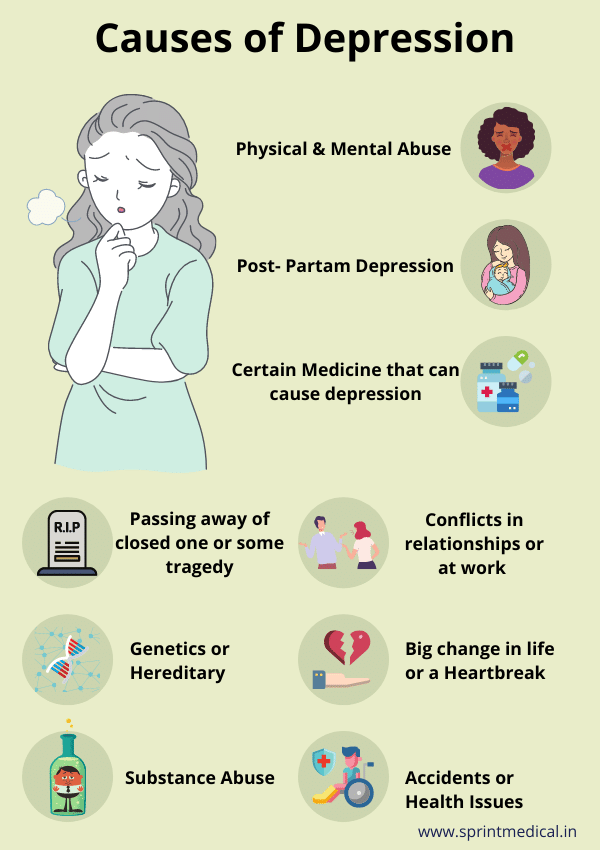
The causes of depression vary among individuals. Some individuals experience sadness or unhappiness from time to time, while others experience depressive symptoms every day. Other people suffer from psychosis or antenatal depression, which occurs during pregnancy. Nevertheless, there are a number of common factors that can contribute to depression, and a visit to the GP is a good idea. A comprehensive medical examination is needed to determine the root cause of your condition.
Physical illnesses and injuries can also affect mental health. Some chronic conditions, such as arthritis, can cause a negative impact. Other long-term health problems, such as chronic or reoccurring diseases, can change your lifestyle and make you depressed. Your doctor may also offer to treat your depression as part of your overall treatment. Some health issues are connected to the brain, such as hormones or the menstrual cycle. Other physical health conditions, such as substance abuse, can affect your mental health as well.
Some physical issues can negatively affect your mental health. These include chronic diseases, physical injuries, or lifestyle changes. Some physicians offer mental health treatment as a separate service, or they may provide it as part of a comprehensive treatment plan. Other issues that may contribute to depression include hormonal imbalances, hormonal disorders, low blood sugar, and chronic pain. All of these can lead to increased levels of stress, which can make it difficult to sleep and feel good.
Physical ailments and injuries can affect your mental health. Human genes are responsible for creating proteins involved in biological processes. A person’s genes turn on at different times during his life, and the disruption of one gene can change his biology. Some medical treatments for depression are available online https://consultordesalud.com.ar/, but they may not address the underlying causes of your condition. They can make your condition worse or lead to an anxiety disorder or a panic attack.
A person’s health can affect their mental health. Some medical conditions can cause depression. Certain medical conditions, such as high blood pressure or hormonal imbalances, can increase your chances of developing depression. Although the effects of drugs and alcohol are usually temporary, they can make depression worse. These drugs and alcohol can even increase the symptoms of the disease. Thus, it is very important to avoid these substances and seek professional help for depression. These medicines will help you manage your symptoms of depression, but they won’t cure it.
Biologically, life circumstances play an important role in the development of depression. Studies have shown that depression is associated with decreased activity in the frontal lobes of the brain. In addition, studies have shown that certain medications, such as antidepressants, can cause symptoms of depression. Although there is no clear link between genetics and depression, these drugs may be one of the factors contributing to the development of depression. Your doctor can prescribe the right medicine for you.
Many physical illnesses can also affect the mood. Some people are at risk of depression due to a physical illness. Other conditions can be inherited or develop later in life. A lack of sleep and low blood sugar are two other causes of depression. For women, there are hormonal changes related to menstruation. Some of these conditions are inherited. However, they are often the result of an underlying mental health issue. In addition to physical illnesses, the presence of a psychological illness can affect the quality of one’s life.
Symptoms of depression can include physical illnesses and emotional events. A loved one’s death or a difficult event can exacerbate the problem. Other physical conditions, such as chronic or long-term pain or illness, can cause depression. Sometimes, a medical condition can cause depression. Some medications can have side effects, including a reduced appetite or decreased energy. While the symptoms of depression are often permanent, some people may experience a temporary period of depression.
A physical illness or injury can affect the person’s mental health. Long-term health problems, including diabetes and cancer, can change a person’s lifestyle and can exacerbate the symptoms of depression. Some doctors may offer mental health treatment as part of a complete treatment for a physical illness. Other physical ailments can also contribute to depression and are linked to hormonal imbalances. A lack of sleep and low blood sugar can lead to mental health problems.